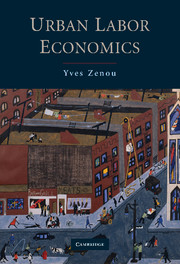Book contents
- Frontmatter
- Contents
- Preface and Acknowledgments
- Introduction
- PART 1 URBAN SEARCH-MATCHING
- PART 2 URBAN EFFICIENCY WAGES
- PART 3 URBAN GHETTOS AND THE LABOR MARKET
- General Conclusion
- A Basic Urban Economics
- B Poisson Process and Derivation of Bellman Equations
- C The Harris-Todaro Model
- Bibliography
- Author Index
- Subject Index
PART 2 - URBAN EFFICIENCY WAGES
Published online by Cambridge University Press: 05 June 2012
- Frontmatter
- Contents
- Preface and Acknowledgments
- Introduction
- PART 1 URBAN SEARCH-MATCHING
- PART 2 URBAN EFFICIENCY WAGES
- PART 3 URBAN GHETTOS AND THE LABOR MARKET
- General Conclusion
- A Basic Urban Economics
- B Poisson Process and Derivation of Bellman Equations
- C The Harris-Todaro Model
- Bibliography
- Author Index
- Subject Index
Summary
In the first part of this book, we have developed different models of urban search-matching. There is another dominant model in labor economics, which is the efficiency wage framework initially developed by Shapiro and Stiglitz (1984). The initial idea was to explain unemployment by high and rigid wages in order to give some microfoundations for the Keynesian framework. Indeed, because shirking is very costly and monitoring is imperfect, firms set a sufficiently high wage to induce workers to work hard. In equilibrium, wages are too high as compared to the market-clearing wages and downward rigid. As a result, unemployment emerges in equilibrium. In the search-matching framework, search frictions were responsible for unemployment, while here, high wages are the main culprit. In this part, we will expose the different urban efficiency wage models, starting with the benchmark models and then extending them in different directions.
Whether search frictions and bargain wages or efficiency wages are the correct model for explaining unemployment and wage setting is a matter of empirical relevance. We have seen that there is a host of empirical papers showing the importance of frictions in the labor market. What about efficiency wages?
The standard way of testing the efficiency wage model is very indirect. Indeed, the traditional ways of testing the efficiency wage theory is to examine whether there are large wage differences between sectors for identical workers that are unexplained by observable worker characteristics. This literature (Dickens and Katz, 1987; Kruger and Summers, 1988; Murphy and Topel, 1990; Neal, 1993) mainly shows that these unexplained differences can be attributed to differences in supervision/monitoring rates.
- Type
- Chapter
- Information
- Urban Labor Economics , pp. 167 - 170Publisher: Cambridge University PressPrint publication year: 2009



